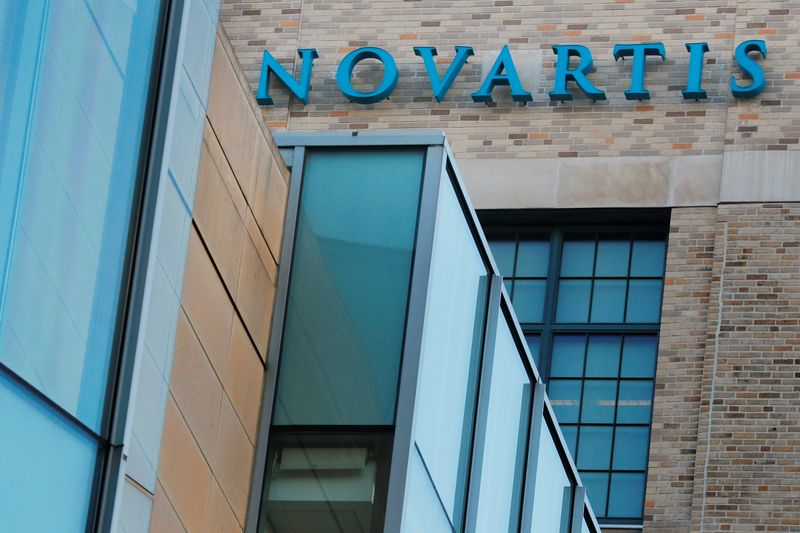Europe’s generic drugmakers may cut output due to surging energy bills By Reuters

© Reuters. A sign marks Novartis’ Institutes for Biomedical Research in Cambridge, Massachusetts, U.S., January 2, 2020. Picture taken January 2, 2020. REUTERS/Brian Snyder
2/3
By Ludwig Burger
FRANKFURT (Reuters) – Europe’s drug makers have warned they may stop making some cheap generic medicines because of surging electricity costs and are calling for an overhaul of the way they are priced, the latest industry to seek help as the energy crisis deepens.
The generic drug industry lobby group Medicines for Europe, which represents companies including Teva, Novartis’s Sandoz unit and Fresenius SE (ETR:)’s Kabi business, on Tuesday sent an open letter to European Union member states’ energy and health ministers ahead of their extraordinary EU Council meeting on Friday, calling for measures to ease the cost burden.
The letter was also addressed to key European Commissioners. The recipients did not respond to requests for comment given the late hour.
Electricity prices have risen ten-fold for some drug factories in Europe and raw material costs have risen by between 50% and 160%, according to the letter.
Generics associations in member states are also petitioning national heath authorities for more flexibility on drug prices, said Medicines for Europe.
“We may discontinue maybe three, maybe five products due to the direct and indirect impact of increasing energy costs,” said Elisabeth Stampa, chief executive of Medichem SA, a generic drugs and pharmaceutical ingredients maker based near Barcelona, Spain.
Medicines for Europe’s director general Adrian Van Den Hoven told Reuters that higher energy costs were hitting a sector that was forced to consolidate due to price pressure, making the market more vulnerable to supply outages and shortages.
“Higher energy costs just eat all of the margins of many makers of essential medicines in the fixed price system that we operate under in Europe,” he said.
The issue centres on the pricing regime. Off-patent medicines are typically sold by low-cost drugmakers at prices set by national health agencies or insurers’ associations, which frequently also cut prices.
Generics account for about 70% all dispensed medicines in Europe, many of them to treat serious conditions such as infections or cancer, but make up only 29% of the region’s drug bills, according to the lobby group.
The surge in energy costs risks undermining a recent push to boost medicines production in Europe and make the region more self-sufficient after the COVID-19 pandemic exposed a dependence on suppliers abroad and led to a breakdown of certain supply routes.
COVID-lockdown measures in China and the war in Ukraine have made matters worse for logistic and raw material supplies.
Drug supply shortages, which at times disrupt patient care when alternative sources are not available, have a decade-long history in the European off-patent generic drug sector, where pressure on prices by cash-strapped health systems allows only the most cost-efficient suppliers to survive.
While makers of patented innovative drugs are also typically banned from raising prices after a reimbursement rate has been set, the much higher margins keep most of those products profitable.
ENERGY INTENSE
Standard infusions for hospitals are among the most energy intensive drugs to produce because they need to be heated and cooled for sterility. The same goes for the fermentation process behind commonly used antibiotics and therapeutic hormones, said van den Hoven.
Medichem’s Stampa said the effects of expensive energy ranged from higher shipping rates to waste disposal contractors charging 30% more.
She declined to name drugs that might be affected as part of an annual review this year, but said customers would be given about six to 12 months to find a new supplier if a product is phased out.
The privately held group made 110 million euros ($106 million) in sales last year with off-patent products such as antibiotic drips, blood thinners and schizophrenia drugs, selling to generic drug companies including Teva and Viatris.
Stampa said indexing drug prices to take production costs into account would be an affordable fix for health bodies in Europe where some off-patent prescription eye drops are reimbursed for less than the price of a pack of gum.
The president of the Italian pharmaceutical industry association, Marcello Cattani, said energy costs are seven times higher than last year, while the U.S. dollar, in which international ingredients are typically paid, is up against the euro.
“The sector cannot pass on higher costs … The risks of negative impacts on the production and availability of medicines are very high,” he said.
($1 = 1.0394 euros)
For all the latest Business News Click Here
For the latest news and updates, follow us on Google News.
